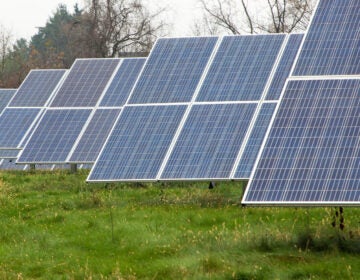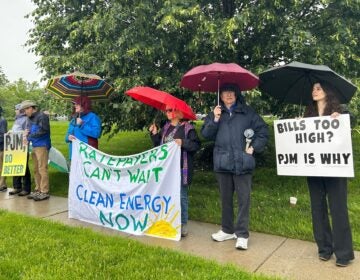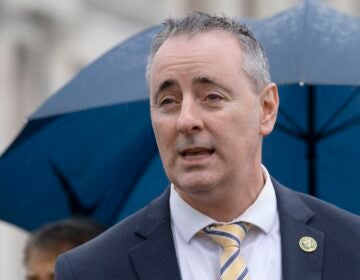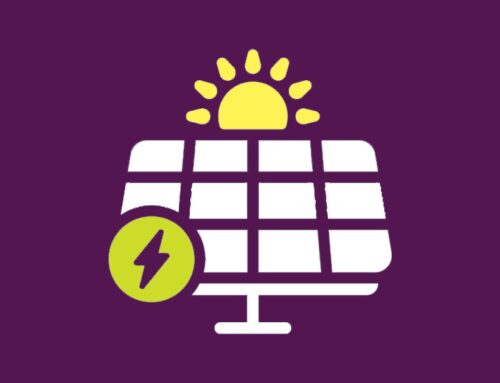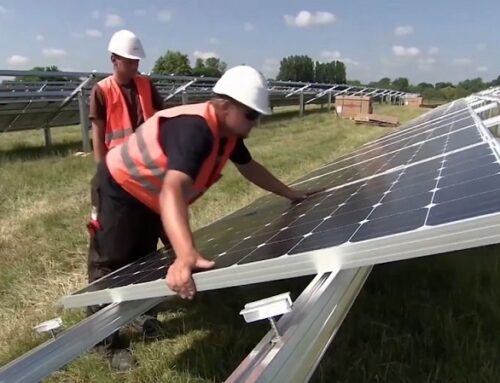From Philly and the Pa. suburbs to South Jersey and Delaware, what would you like WHYY News to cover? Let us know!
Dozens of schools in Pennsylvania plan to install solar panels through Solar for Schools, a new state program that aims to drive down electricity costs for schools while lowering their carbon footprints.
But the budget that passed the U.S House of Representatives last month would roll back federal clean energy tax credits that are key to some schools’ plans.
“We went after this because we thought we would get both the state and federal dollars,” said Daniel McGarry, superintendent of the Upper Darby School District in Delaware County. The district plans to upgrade roofs and install solar projects at five elementary schools and one middle school using over $2 million in Solar for Schools grants, alongside federal tax credits.
“If the federal dollars are cut, we will not be able to move forward with these projects,” McGarry said.
Pennsylvania’s Solar for Schools program awarded its first batch of funding to 74 schools last month to much fanfare. Districts are expected to use the state money to leverage federal clean energy tax credits made available to schools for the first time under former President Joe Biden’s Inflation Reduction Act. Architects of the state grant program had said that by combining the grants with the federal credits, cash-strapped schools could install solar arrays essentially for free, and reap savings on future utility bills.
But the budget bill that passed the House accelerates the expiration of these tax credits, so in order to qualify, schools would need to start building their solar projects within 60 days of the bill’s enactment and start operating them by the end of 2028 – a criteria many say would be impossible to meet. The bill also includes restrictions on where equipment can be made, said Sharon Pillar, director of the Pennsylvania Solar Center, a nonprofit that helped two dozen schools apply for the state grant program.
Together, these rules would be nearly impossible for schools to meet, Pillar said.
While there’s nothing stopping schools from moving forward without the tax credits, losing them would slash the schools’ savings by roughly a third, Pillar said.
“Some of these schools will go forward, and some of them won’t,” she said.
The House-approved budget still needs to pass the U.S. Senate, where lawmakers could scale back the changes to the tax credits, but it’s unclear to what degree. The Senate returned from recess Monday to take up the budget bill.
Projects expected to lower energy bills, save taxpayers money
The Pennsylvania Solar for Schools program, created with state funding last year, provides grants to schools and community colleges that cover up to half the costs of solar energy equipment and installation.
The projects are expected to save districts money on energy bills over the long term, in part by helping the districts avoid rising electricity costs.
“All of that money they can plow back into education,” said Liz Robinson, executive director of the Philadelphia Solar Energy Association, a nonprofit that contracted with the state to produce a toolkit to help schools apply for Solar for Schools.
A solar installation could save the average public school in Pennsylvania around $1 million in electricity costs over 20 years, Robinson said.
For example, the Community College of Philadelphia plans to use a Solar for Schools grant to help build solar arrays on two roofs at its main campus, saving the college — and taxpayers — more than $900,000 over the next 25 years. The college hopes to move forward with its solar projects, said spokesperson Megan Fox.
‘Less savings’ without federal tax credits
The 2022 Inflation Reduction Act allowed tax-exempt entities, like local governments and schools, to utilize clean energy tax credits for the first time. These credits offer reimbursement payments to schools that cover 30% or more of the costs of a solar project.
The Upper Darby School District expected these federal tax credits to cover over $2 million of the total $9 million cost of its six solar projects.
But the timelines set out in the House bill would likely be difficult, if not impossible for the district to meet, because the district needs to vet and choose contractors, get approval from the school board, acquire supplies through the contractors and wait until schools are closed during the summer to begin construction, officials said. Districts also need approval from utilities to connect the projects to the local grid.
The soonest the Upper Darby School District could start to build its solar projects would be next summer, officials said.
Without the federal tax credits, the solar projects would eat up most of the district’s yearly capital budget at a time when federal funding for operational costs is uncertain, McGarry said. This could mean sacrificing crucial facilities projects, such as replacing windows, renovating old bathrooms and upgrading security systems, he said.
“We can’t afford to do that,” McGarry said.
The Upper Darby School District is not alone. The William Penn School District would not be able to complete a Solar for Schools project planned for Park Lane Elementary School without the federal tax credit, said district Chief of Operations Darnell Deans.
“As our district is under-resourced and we are still advocating for our appropriate level of funding, our district will not be able to proceed with this project without the tax credit,” Deans wrote in an email.
Pennsylvania state Rep. Elizabeth Fiedler, who sponsored the Solar for Schools legislation, said she’s confident the projects will still save schools money, even if the schools are not able to use the federal tax credits.
“Obviously, if the federal IRA incentives for renewable energy are cut, that would mean less savings for schools,” she wrote in a statement.
When awarding the state grants, the Pennsylvania Department of Community and Economic Development believed the schools could complete the projects without the federal tax credits, said spokesperson Justin Backover.
Still, Shannon Crooker, Pennsylvania director at the nonprofit renewable energy advocacy organization Generation180, worries these slimmer savings would force many districts to abandon the projects.
“We’re at risk of losing a lot of great investment,” she said.
WHYY is your source for fact-based, in-depth journalism and information. As a nonprofit organization, we rely on financial support from readers like you. Please give today.


